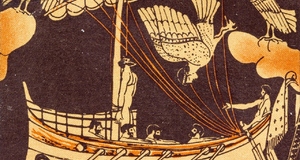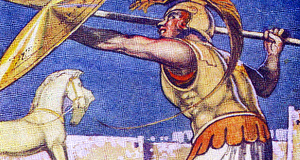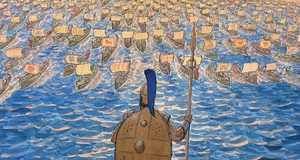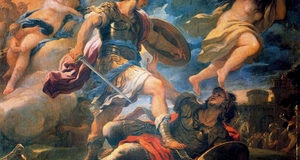Confrontation with Death Illuminates Death's Mystery in the Odyssey
By
2009, Vol. 1 No. 11 | pg. 1/1
KEYWORDS:
Even in fairy tales and fantastical legends, the trespassing of the breathing upon the domain of the spirits is rare. It is a disturbing idea; when the dead visit our world, we can at least find comfort in numbers. Yet the hero Odysseus braves the unknown and looks into the eyes of death. And as ghostly whispers blow across the hair on his arms we expect him to return traumatized, changed, darkly enlightened—but no. He emerges a little puffy-eyed, but very much himself. Several times Odysseus seems close to discovering some deathly mystery, brushing the stardust off some universally kept secret, like a skull long buried; but the moment transforms itself rather quickly into another shape, like grief or warning, more suited for the realm of living. Ultimately, after Odysseus ventures into the Kingdom of the Dead, he isn’t endowed with the wisdom to fathom death in its gravity and implications any more than he was before; in fact his exploits there suggest that understanding of death will have no profound influence on his life path. Elpenor appearing to Odysseus, first of all the spirits, generates significant shock value that cannot be overlooked. Just a few hours ago—in book-time, not three pages ago—he was breathing, and then, before the characters or the audience can even digest his death, he stands lifeless before the hero. This suggests something about the constant proximity of death, about its quality of suddenness, of swiftness, which is not lost on Odysseus. He alludes to it in his heartsick greeting: “‘Elpenor, / how did you travel down to the world of darkness? / Faster on foot, I see, than I in my black ship’” (251). Yet as we wait to see how his tangential discernment will affect Odysseus, the conversation shifts to the practical matter of a proper burial for Elpenor, with no hint of how coming face-to-face with a dead shipmate may alter Odysseus’ outlook in some way. The encounter then ends with a revealing parting between the two characters, for Odysseus describes their position as, “I on my side, holding my sword above the blood”—where the living make their abodes—“he across from me there…” (252)—where the dead stake their wanderings. This most simple geographical image demonstrates clearly the figurative impassible division between Odysseus and Elpenor; Elpenor, who may by himself represent the all-encompassing nature of death, which despite his youth stole his breath as mercilessly as it did Odysseus’ mother or fellow super-warriors, is now incomprehensible to Odysseus.Odysseus’ meeting with the ghost of Agamemnon is similarly characterized by the stark contrast between their state of being and what they discuss: the consequences of Agamemnon’s death, not the fact of his being dead (and of Odysseus being alive) in itself. This, again, dawns on Odysseus to some degree when Agamemnon first attempts to embrace him. Odysseus says that “the great force was gone, the strength lost forever” (262), an observation so wrought with suggestion about some distinct finality of death that, when associated with Agamemnon—with whom he fought beside for a decade, with whom he watched thousands die—one almost expects Odysseus to be knocked over backwards by the blinding truth of it all. But instead he is, again, seized by elements of the living, simultaneously overcome with sadness (“So we stood there, trading heartsick stories, / deep in grief, as the tears streamed down our faces” [264]) and distracted by the fruit of Agamemnon’s bitterness, manifested in the form of advice (“when you reach your homeland steer your ship / into port in secret, never out in the open…/ the time for trusting women’s gone forever! [264]). As with his promise to bury Elpenor, Odysseus will comply with Agamemnon’s warning, and thereby his actions will be affected by his visit with the residents of Hades; but his overall mindset and the road down which he is steering remain undisturbed. Likewise Anticleia, Odysseus’ mother, feels the universal tear separating her from her son and verbalizes it: “Oh my son—what brings you down to the world / of death and darkness? You are still alive! / It’s hard to the living to catch a glimpse of this… / Great rivers flow between us, terrible waters…” (254). In what may be the most explosive and most high symbolic moment in the story, Odysseus recalls that he tried and failed to embrace his mother, lamenting to his audience, “Three times I rushed toward her, desperate to hold her, / three times she fluttered through my fingers, sifting away / like a shadow, dissolving like a dream” (256). He cannot physically grasp her body, as he cannot mentally, emotionally, or in any capacity grasp the state of her soul; she is beyond his comprehension. This disturbs Odysseus as it does not with any of the other spirits, and by his own account, he appears to be driven beyond grief and frustration to hysteria, crying dangerous blasphemies such as, “Or is this just / some wraith that great Persephone sends my way / to make me ache with sorrow all the more?” But Anticleia soothes him, and with the words, “But you must long for the daylight” (256), she seems to release him (regardless of his will) from what was a temporary neurotic obsession with a phenomenon he simply could not understand. And as Anticleia is the first spirit Odysseus speaks with after Tiresias, perhaps her words set Odysseus’ mindset as he continued to look into the eyes of death. Strangely enough, Achilles, who in The Iliad breeds confusion with his unpredictable temper and his championing of false principles, delivers the clearest assessment of his predicament as the walking dead: “By god, I’d rather slave on earth for another man— / some dirt-poor tenant farmer who scrapes to keep alive— / than rule down here over all the breathless dead” (265). The bottom line being, obviously, that under all circumstances life is better than death. With this verbal realization Achilles completely undermines, in fact effectively blows to pieces, his role in the Trojan War—and, as he was the war’s greatest hero, and as Odysseus has spent an entire era of his lifetime fighting in the war and recovering from its after effects, we expect that this should rattle Odysseus to his core. But no; he does not reference his own thoughts at all, except for sympathy with Achilles’ own situation, saying, “So he grieved but I tried to lend him heart [by giving him news of his son]” (266). In truth, the only conclusion is that to Odysseus Achilles’ words are simply that—words. The fact is that he is alive, and Achilles is dead, rendering even dimmer any illumination he may have achieved through the glum drudgery of the underworld. But the prophet Tiresias lends this segment its meaning. In the course of laying out the remainder of Odysseus’ journey for him, he tells him, too, that Ithaca is not the last stop: “But once you have killed those suitors in your halls— / by stealth or in open fight with slashing bronze— / go forth once more, you must…” (253). No matter what methods he uses or which paths he forges to find home and peace, then, it will not feel like home, and he will not be at peace. He will be restless, a slave to his nature, to the track he is carving—that fate has carved for him already. He has always barreled forward and will continue to barrel forward without thought of an ending which renders all the striving fruitless; discovery of the mystery of death which looms somewhere in the peripherals would upset his whole outlook, and therefore, maybe, throw off the balance of the cosmos. Who knows? That Tiresias can even prophesize from the Kingdom of the Dead is puzzling and begs speculation on whether death can be trumped, by fate or otherwise—Odysseus will never know, and maybe—daringly, more universally—no one will know because death is not a lesson to be learned by the living. Suggested Reading from Inquiries Journal
Inquiries Journal provides undergraduate and graduate students around the world a platform for the wide dissemination of academic work over a range of core disciplines. Representing the work of students from hundreds of institutions around the globe, Inquiries Journal's large database of academic articles is completely free. Learn more | Blog | Submit Latest in Literature |















